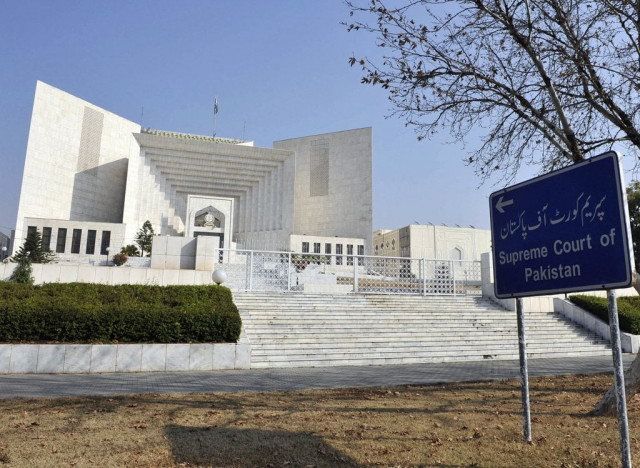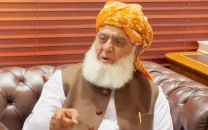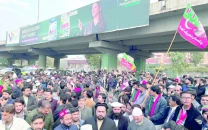‘Arshad Malik video evidence may still be considered in Nawaz case’
SC says high courts have discretion on allowing audio, video evidence

The Supreme Court of Pakistan. PHOTO: AFP
“As regards relevance and admissibility into evidence of the audiotape or video, suffice it to observe that the said part of the order under review was meant only to be compendium of the legal opinion coming to our notice on the subject, which might not be exhaustive, and the door of further interpretation on the subject was not and could not be closed in this regard”, says a three-page written order authored by Chief Justice of Pakistan (CJP) Asif Saeed Khosa in response to a review petition filed by Nawaz Sharif through his counsel, Khawaja Haris.
A three-judge bench headed by the Chief Justice in the judge video scandal case on August 23 laid down strict criteria to explain as to how a video would be considered genuine and how the evidence would be proved before a court of law.
Later, Nawaz Sharif, challenging the order, had objected to the Supreme Court (SC) passing a ruling without providing Nawaz an opportunity to be heard, terming it a violation of the constitutional guarantee that all citizens will be treated by the law.
The PML-N chief, in his review petition, had prayed the SC to clarify that nothing in the order is to be construed as precluding him from agitating any of the questions before a learned Appellate Court or before any other court or authority set up by law; and that the learned Appellate Court, or any other court or authority before whom any such question is raised, shall decide the same without in any manner being influenced by anything said, or finding given, by the SCP in the order dated 23.08.2019”. In response, the court noted that, in the interest of justice, the clarification sought had been granted.
The court also clarified that its order did not tie the hands of the Islamabad High Court (IHC) in the exercise of its jurisdiction and in choosing from the various options legally available to it in the matter of deciding the appeal filed by Nawaz Sharif against his conviction. The apex court also reproduced the relevant paragraph of its August 23 order wherein it was held that the IHC had choices available to it to decide the matter.
Regarding Nawaz Sharif’s contention that he had not been issued a notice to appear in the case, the SCP order explained that the Constitutional petitions in the judge video scandal case had never been admitted for regular hearing and, therefore, there was no need for the issuance of a notice to Nawaz Sharif, particularly when no adverse order was being passed against him.
August 23 order:
Laying down requirements, the court notes that no audiotape or video can be relied upon by a court until the same is proved to be genuine and not tampered with or doctored. A forensic report prepared by an analyst of the Punjab Forensic Science Agency in respect of audio tape or video is per se admissible into evidence given the provisions of Section 9(3) of the Punjab Forensic Science Agency Act, 2007.
It also says that, under Article 164 of the Qanun-e-Shahadat Order, 1984, a court has discretion regarding the presentation of audiotape or video evidence in court. However, even where a court allows audio tape or video to be presented as evidence, it says such audiotape or video has to be proved by the law of evidence.
“Accuracy of the recording must be proved and satisfactory evidence, direct or circumstantial, has to be produced to rule out any possibility of tampering with the record”.
It further says that an audiotape or video sought to be produced as evidence must be the actual record of the conversation as and when it was made or of the event as and when it took place.
The court noted that the person recording the conversation or event has to be produced. The person recording the conversation or event must produce the audiotape or video himself. The audiotape or video must be played in court. An audiotape or video produced before a court as evidence ought to be audible or viewable. The person recording the conversation or event must identify the voice of the person speaking or the person seen or the voice or person seen may be identified by any other person who recognizes such a voice or person.
It says any other person present at the time of the occurrence of the conversation or event may also testify in support of the conversation heard in the audiotape or the event shown in the video. The voices recorded or the persons shown must be properly identified. The evidence sought to be produced through an audiotape or video has to be relevant to the controversy and otherwise admissible. Safe custody of the audiotape or video after its preparation until production before the court must be proved.
“The transcript of the audio tape or video must have been prepared under independent supervision and control. The person recording an audiotape or video may be a person whose part of routine duties is recording audio tape or video and he should not be a person who has recorded the audiotape or video to lay a trap to procure evidence. The source of audiotape or video becoming available has to be disclosed, it adds.
The court further states that the date of acquiring the audio tape or video by the person producing it before the court ought to be disclosed by such person. An audio tape or video produced at a late stage of a judicial proceeding may be looked at with suspicion. Also, a formal application has to be filed before the court by the person desiring an audiotape or video to be brought on the record of the case as evidence, it adds.


















COMMENTS
Comments are moderated and generally will be posted if they are on-topic and not abusive.
For more information, please see our Comments FAQ